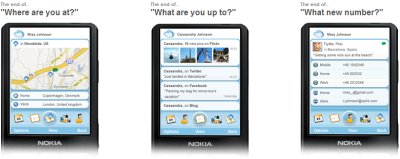Since I cannot attend personally the launch of the free mobile phone calls MVNO
Blyk that is being held in these very minutes in London, I can only present the press release. I also got a Powerpoint presentation as PDF that explains more comprehensively how the advertising sponsored MVNO works.
Before becoming a customer you have to fill in a long questionnaire about your consumption preferences. Later you get advertising in every SMS you receive from a friend. Apparently before every phone call you have to answer questions like "Which of these celebs are you the most like: Eva Longoria, Penélope Cruz, Claudia Schiffer, Naomi Campbell, ... ?" and Blyk recommends you the adequate L'Oreal lipstick.
That makes me wonder what happens to customers who don't look similar to super models. Are they not allowed to talk?
Reference: Press Announcement
Release Date: 24 September, 2007
Blyk goes live
The world’s first advertising funded mobile network for 16-24 year olds launches in the UKLondon, 24 September, 2007 - Blyk, the new mobile network for 16 to 24 year olds today announced the launch of its UK service. The announcement was made by the company founders Pekka Ala-Pietilä and Antti Öhrling at a press launch event in London this morning. Blyk is an invitation-only mobile virtual network operator (MVNO) that links young people with brands they like and gives them free texts and minutes every month.
For brands, Blyk is an innovative, new media channel, providing direct access to the 16-24 year old market; enabling them to create awareness, build relationships and drive sales to this hard to reach audience. Since its conception early last year, Blyk has been undertaking extensive research in the UK with user group studies and live user trials. These have helped to make the offering extremely compelling for young people and advertisers alike.
Pekka Ala-Pietilä said: “We have spent the last year developing a unique, robust advertising content engine and whilst the technology we are using is incredibly advanced, the main premise of Blyk is driven by 3 basic principles – ease of use, interaction and relevance of the communications.”
Blyk understands the importance of relevancy in communication and has built its system to enable this. By means of profile questions at sign-up and ongoing SMS polling during membership Blyk Media enables brands to target messages like no other medium. Response rates have also been exceptionally high, with some testers reportedly missing the service at the end of the trial.
Further to this Öhrling said: “We found that what is 90% familiar and 10% new leads to the best user experience. So, the Blyk communications formats are based on the most dominant and most familiar pattern among 16-24s: Getting a message and responding to it. Both picture and text.”
Brands will be able to engage Blyk members in question/response type interactions. For members these interactions are free. For advertisers all responses and interactions by members are tracked, giving great accountability to the campaign.
“We found throughout our research that this simple, familiar type of interaction leads to tremendous response rates. “ says Öhrling. Speaking at the network’s launch in London today, Pekka Ala-Pietilä said:
“Our free offer is 217 texts and 43 minutes every month and this could mean no more phone bills for up to 4.5 million young people in the UK - with no contract. We have the brands that want to speak to them too, with more than 40 already signed up for the launch. This group represents almost every industry sector there is.”
“It’s going to spread because, at the heart of it, it’s got a creative idea. A mobile phone network that’s funded by advertising; that’s something you want to tell people about. Fundamentally it’s the interaction that young people do most on their mobile phone: receiving and responding to a message.” says Antti Öhrling.
About Blyk
Blyk is the new mobile network for 16 – 24s that’s funded by advertising. Blyk links young people with brands they like and gives them free texts and minutes every month. Blyk was co-founded in 2006 by Pekka Ala- Pietilä and Antti Öhrling and has offices in Helsinki, Finland and London, UK. Blyk is now operating in the UK, with other European markets to follow.
For more information, visit about.blyk.com.
ENDS
Notes to Editors:
Invitations to join Blyk will be sent out over the next few weeks via channels targeted to reach 16-24 year olds.
For further information, please contact:
UK Trade media:
Karen Keany
The Practice, telephone +44 (0) 20 7812 0662/mobile +44 (0) 7989 429 367
Karen@thepractice.org.uk
UK Consumer media:
Rax Lakhani
Splendid Communications, telephone +44 (0) 20 7324 7200
rax@splendidcomms.com
International media:
Irene Nyberg-Jarventaus
Blyk, +44 (0) 7747 844 854
irene@blyk.com
Blyk limited
Registered office:
4 th Floor
80 Leadenhal Street
London EC3A 3HA
Registration number: 05778607

